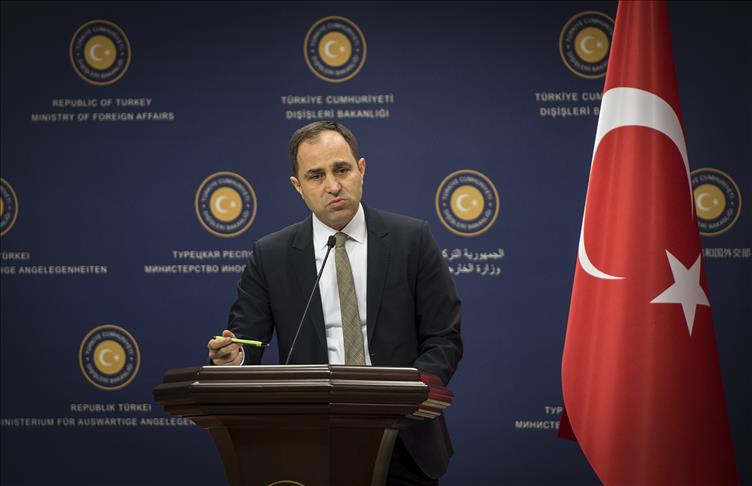
ANKARA
Turkey has welcomed Palestine's official membership to the International Criminal Court at The Hague.
In remarks made at the weekly press briefing Thursday, Turkish Foreign Ministry spokesman Tanju Bilgic said: "This decision of Palestine should be considered within the framework of sovereignty principle and must be respected."
Palestine automatically joined the Rome Statute on April 1 two months after the country filed its membership request at the UN. Palestine can now request to have Israeli leaders referred to the court for alleged war crimes committed on Palestinian soil.
"The Israel-Palestine problem should be resolved in a comprehensive and persistent manner, and the peace process should be reactivated," Bilgic said.
He urged United Nations Security Council members and the international community to fulfill their obligations over the issue.
Israel occupied East Jerusalem during the 1967 Arab-Israeli War. It later annexed the historic city of Jerusalem in 1980, claiming it as the capital of the self-proclaimed Jewish state in a move that has never been officially recognized by the international community.
Palestinians accuse Israel of waging an aggressive campaign to "Judaize" the city with the aim of effacing its Arab and Islamic identity, and ultimately driving out its Palestinian inhabitants.
The spokesman also spoke about last week's evacuation operations to save Turkish people trapped in Yemen, saying "a total of 48 Turks remain in Yemen right now; 36 in Sana'a and 12 in Aden."
Bilgic also mentioned that some Turks had "willfully" decided to stay put in Yemen.
A total of 230 people, including Turkish citizens, were flown to Istanbul on Sunday from Yemen, which has been in turmoil since September, when the Houthi militia overran the Yemeni capital of Sana'a.
Several Arab states have joined the Saudi-led offensive in Yemen, which began on March 25 with a string of airstrikes on Houthi militia positions.
Bilgic touched upon the issue of foreigners joining militant groups in Syria and Iraq. He said a workshop meeting to tackle the issue was held in Istanbul on April 7 under the co-chairmanship of the Netherlands and Turkey.
When asked about the upcoming so-called "Armenian genocide motions" to be voted in the European Parliament and in the Netherlands, Bilgic said Turkish authorities had conveyed Turkey's concerns to the head of European Parliament, Martin Schulz.
"Foreign Minister Mevlut Cavusoglu has already said that no parliament can have a resolution on the issue and explained that this must be left to historians," he said.
He also said that Turkish-origin people in the Netherlands too had spoken against such a move and gave their message to the Dutch Foreign Minister Bart Koenders that such a resolution was not in the interest of its government.
The 1915 incidents took place during World War I when a portion of the Armenian population living in the Ottoman Empire sided with the invading Russians and revolted against the empire.
A decision by the Ottoman Empire to relocate Armenians in eastern Anatolia followed the revolts and there were some Armenian casualties during the relocation process.
Armenia has demanded an apology and compensation, while Turkey officially refutes Armenian allegations over the incidents, saying that, although Armenians died during relocations, many Turks also lost their lives in attacks carried out by Armenian gangs in Anatolia.
The debate and differing opinions between the present day Turkish government and the Armenian diaspora, along with the current administration in Yerevan, still generates political tension between Turks and Armenians.
Anadolu Agency website contains only a portion of the news stories offered to subscribers in the AA News Broadcasting System (HAS), and in summarized form. Please contact us for subscription options.







